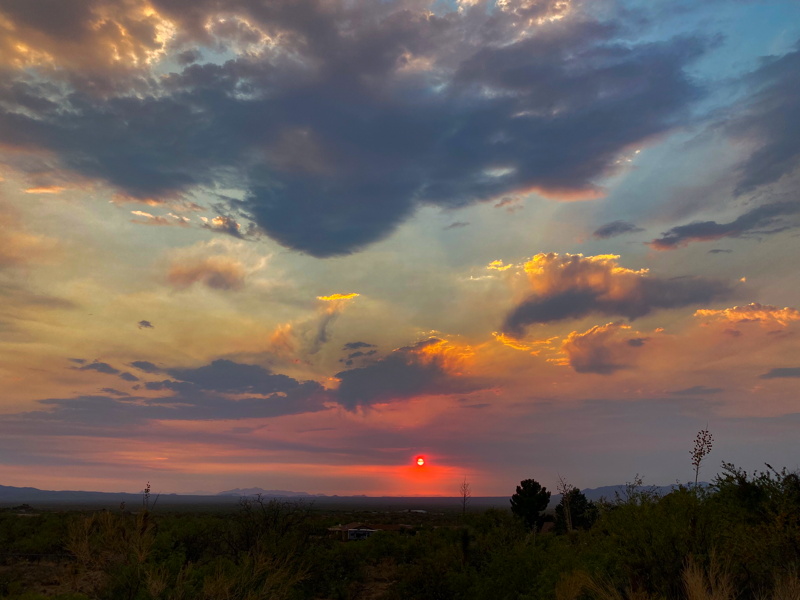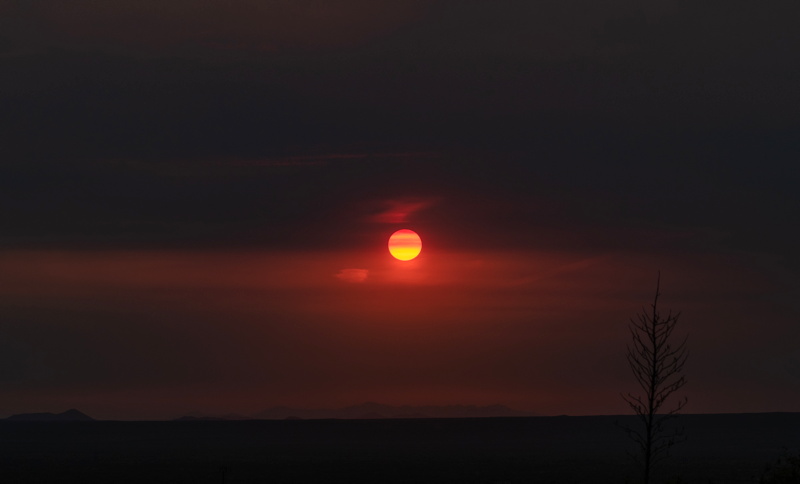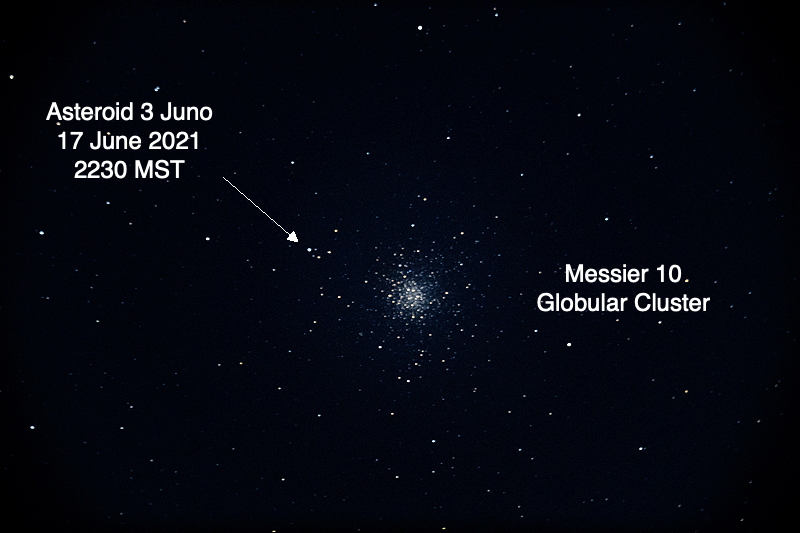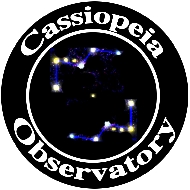Winged Things,
Asteroid Juno and Messier 10 Globular Cluster
Posted: 18 June 2021
Sunday, 13 June 2021, was mostly clear but still had smoky skies from wildfires in Mexico. The two wildfires 70 miles north of Oracle were still burning. The Telegraph Fire had burned 88,155 acres and was 76% contained by Sunday evening and the Mescal Fire was still at 72,250 acres burned with 85% containment. Oracle is under an Excessive Heat Warning until Friday night. Temperatures over 110°F have already been seen here. Glad I have an Air Conditioner in the observatory. I set the AC timer to come on an hour earlier in the morning and run 30 minutes longer. Due to an early commitment Monday morning I did not open the observatory Sunday. Monday, 14 June, was partly cloudy and totally smoky due to all the wildfires. As sunset approached the sky was mostly cloudy. The Sun was reddened by the smoke. Sunspot AR2833 is visible at the top of the Sun in the last photo.



Tuesday, 15 June, the sky was partly cloudy and very smoky. The Telegraph Fire had increased to 139,615 acres burned (59% contained) and merged with the Mescal Fire by Tuesday evening, totaling 200,000 acres burned (fifth largest wildfire in Arizona history). Wednesday, 16 June, was partly cloudy with smoky skies. Thursday, 17 June, dawned partly cloudy. The Telegraph Fire was at 165,740 acres (72% contained). The Mescal Fire was now 90% contained.
As sunset approached, the sky was mostly clear but smoky. I decided to open the observatory to try to image Asteroid 3 Juno near the globular cluster M10.
|
Open: Thursday, 17 June 2021, 1828 MST Temperature: 96°F |
Session: 1647 Conditions: Mostly clear, smoky, breezy |
Equipment:
12" f/8 LX600 w/StarLock
2" 24mm UWA eyepiece
Camera:
D850 DSLR
iPhone 11 Pro Max
Relaxed on the observatory patio bench.
Took some photographs of winged things using the D850 DSLR and 150-600mm lens (cropped).
Cowbird

Willow Flycatcher

Cowbirds

Airliners composite

Smoky sky (iPhone 11 Pro Max, 0.5X lens)

Setting Sun with sunspot AR2833 (D850 DSLR, f/8, 1/250sec, ISO400, FL600mm)

1937 MST: sunset. Calm now.
1942 MST: LX600 ON, StarLock OFF, High Precision OFF.
Viewed the planet Venus, 102X. Then viewed the Moon, 102X.
Mounted the D850 DSLR at prime focus of the 12" telescope. Took this photo of the Moon (1/320sec, ISO640, slight crop).

Did some lunar observing, 102X.
2007 MST: slewed to M10 (globular cluster). It was not yet visible in the bright sky. Relaxed on the bench to watch the stars come out.
2016 MST: strong winds came up!
2036 MST: M10 now visible, 102X. Still very windy.
2046 MST: mounted the D850 DSLR at prime focus, focused on Vega, locked the 12" mirror mirror, and slewed to M10.
2057 MST: StarLock ON.
2100-2300 MST: did StarLock autoguided, prime focus imaging of M10 (globular cluster) and Asteroid 3 Juno, ISO6400, at 30 minute intervals. The wind made autoguiding very erratic and many of the images were bad. This is the best image (18 seconds exposure).

This animation of images at 2200, 2232, and 2300 MST, shows the Asteroid Juno approaching the globular cluster.

2306 MST: StarLock OFF.
I will try again Friday night, 18 June, to get better images. Hopefully it will be calm.
2314 MST: viewed Asteroid 3 Juno and M10 (globular cluster), 102X.
2315 MST: LX600 OFF.
|
Close: Thursday, 17 June 2021, 2326 MST Temperature: 88°F |
Session Length: 4h 58m Conditions: Mostly clear, smoky, windy |
16 June 2021: Explore Scientific announced that my iPhone photo of a partially eclipsed Sun taken with a Coronado PST (Hydrogen-Alpha) had won First Place in their Smartphone Astrophotography contest. Here's the photo. Thanks Explore Scientific!

Comments are welcome using Email. Twitter users can use the button below to tweet this report to their followers. Thanks.
Cassiopeia Observatory Home Page
Copyright ©2021 Michael L. Weasner / mweasner@me.com
URL = http://www.weasner.com/co/Reports/2021/06/18/index.html
